|
|
|
Sort Order |
|
|
|
Items / Page
|
|
|
|
|
|
|
| Srl | Item |
| 1 |
ID:
135251
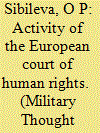

|
|
|
|
|
| Summary/Abstract |
The author examines Russia’s national security problems originating from the flaws in its legal system and takes a close look at the operation of Russian courts and the European court of human rights.
|
|
|
|
|
|
|
|
|
|
|
|
|
|
|
|
| 2 |
ID:
080839
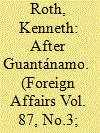

|
|
|
|
|
| Publication |
2008.
|
| Summary/Abstract |
The U.S. detention facility at Guantánamo Bay has become a stain on the United States' reputation. Shutting it down will cause new problems. Rather than hold terrorism suspects in preventive detention, the United States should turn them over to its criminal justice system
|
|
|
|
|
|
|
|
|
|
|
|
|
|
|
|
| 3 |
ID:
063236
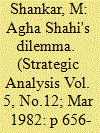

|
|
|
| 4 |
ID:
130074
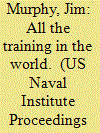

|
|
|
|
|
| Publication |
2014.
|
| Summary/Abstract |
My opinion has not changed-although my explanation might-and this is an issue that continues to plague the armed forces. The Navy has even embraced sub-themes for Sexual Assault Awareness Month (SAAM); for the first half of April, the message is "Live Our Values." That was my intended meaning: Sexual assault is contrary to our core values.
My friend's criticism was part of a cordial, yet emotionally driven discussion, and it was enlightening. It was accompanied by the story of a young sailor who faced blatant sexual harassment from her leading petty officer.
That sailor was subjected to repeated inappropriate comments in public, and more graphic comments in smaller groups. These remarks were overheard by a chief petty officer who asked the junior sailor if she wanted him to talk to the petty officer. Harassment and assault are two very different things, but a lax attitude toward the former diminishes an atmosphere of respect, the overarching theme of SAAM 2014.
|
|
|
|
|
|
|
|
|
|
|
|
|
|
|
|
| 5 |
ID:
132006
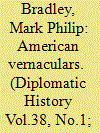

|
|
|
|
|
| Publication |
2014.
|
| Summary/Abstract |
On a wintry January evening in 1973, the members of Amnesty International USA Group 11 gathered on the Upper East Side of New York City to adopt a new prisoner of conscience, Sutanti Adit of Indonesia. Adit, a medical doctor and the wife of the leader of the Indonesian Communist Party, had been arrested and imprisoned in the ruthless campaigns of repression that followed a failed 1965 coup against the Sukarno government, which had ruled Indonesia since its formal independence from Dutch colonial control in 1950. She was among more than a hundred thousand Indonesians arrested, interrogated (often under torture), and imprisoned by the state. As many as fifty thousand of them remained in custody for more than a decade housed in prison camps whose sanitation, medical facilities, and food were inadequate at best. They were permitted very limited contact with the outside world, including family and friends, and harshly mistreated by prison guards.1
|
|
|
|
|
|
|
|
|
|
|
|
|
|
|
|
| 6 |
ID:
101380
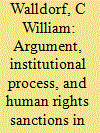

|
|
|
|
|
| Publication |
2010.
|
| Summary/Abstract |
When do humanitarian norms lead great powers, especially democracies, to impose sanctions against strategic partners and allies? I argue that answering more specific questions like this in space and time requires constructivists to focus greater attention on institutional and ideational process. Agents are central to policy change. But the ideational and institutional context in which agents build arguments determines when this change is more or less likely. In this vein, I argue that three factors in liberal states - legislatures, the nature of activist pressure, and strategic ideas - explain when humanitarian norms produce sanctions. I demonstrate the argument through a study of US Cold War relations with South Africa, Turkey, and Greece. Among other contributions, this article demonstrates how attention to process can extend the constructivist agenda into a series of new empirical domains and open avenues for contributions to important policy debates.
|
|
|
|
|
|
|
|
|
|
|
|
|
|
|
|
| 7 |
ID:
095701
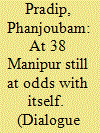

|
|
|
| 8 |
ID:
102887
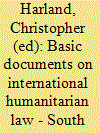

|
|
|
|
|
| Publication |
New Delhi, International Committee Of the Red Cross, 2010.
|
| Description |
xii, 1145p.
|
| Series |
Research information, 0280-6681 ; no. 6
|
|
|
|
|
|
|
|
|
|
|
|
Copies: C:1/I:0,R:0,Q:0
Circulation
| Accession# | Call# | Current Location | Status | Policy | Location |
| 055832 | 341.481/HAR 055832 | Main | On Shelf | General | |
|
|
|
|
| 9 |
ID:
085443
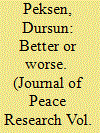

|
|
|
|
|
| Publication |
2009.
|
| Summary/Abstract |
Does economic coercion increase or decrease government respect for human rights in countries targeted with economic sanctions? If economic sanctions weaken the target regime's coercive capacity, human rights violations by the government should be less likely. If, on the contrary, sanctions fail to attenuate the coercive capacity of the target elites and create more economic difficulties and political violence among ordinary citizens, the government will likely commit more human rights violations. Focusing on competing views of why sanctions might improve or deteriorate human rights conditions, this article offers an empirical examination of the effect sanctions have on the physical integrity rights of citizens in target countries.
|
|
|
|
|
|
|
|
|
|
|
|
|
|
|
|
| 10 |
ID:
104796
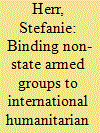

|
|
|
|
|
| Publication |
Frankfurt, Peace Research Insititute Frankfurt (PRIF), 2010.
|
| Description |
38p.
|
| Series |
PRIF report no.95
|
| Standard Number |
9783942532051
|
|
|
|
|
|
|
|
|
|
|
|
Copies: C:1/I:0,R:0,Q:0
Circulation
| Accession# | Call# | Current Location | Status | Policy | Location |
| 056057 | 341.481/HER 056057 | Main | On Shelf | General | |
|
|
|
|
| 11 |
ID:
105576
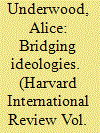

|
|
|
| 12 |
ID:
119946
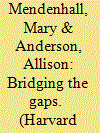

|
|
|
| 13 |
ID:
085415
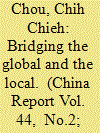

|
|
|
|
|
| Publication |
2008.
|
| Summary/Abstract |
This article aims to explore China's attempt to shift the tension between the global value and local difference over human rights debates. In other words, this article examines the relationship between West-promoted human rights and China-led neo-Confucian values within the context of globalisation rather than examining what Confucian values are. In what ways can a cultural discourse be viewed and employed to promote human rights without denying their universality, is the focal point of this article. This article: (a) reviews why universalist versus relativist is a false dichotomy; (b) introduces the reconstruction of Confucianism since the 1980s in China and examines the possibility of re-appropriating Confucian values; (c) elaborates the necessity of nation-states for resisting the threats of globalisation and for implementing human rights practices; and (d) concludes with Confucian discourse, developed in China, as an exemplary case that universal values and particular differences can be negotiated in a way that respecting cultural differences constitutes a universal value.
|
|
|
|
|
|
|
|
|
|
|
|
|
|
|
|
| 14 |
ID:
110467
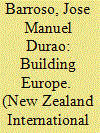

|
|
|
| 15 |
ID:
103879
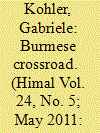

|
|
|
| 16 |
ID:
132533
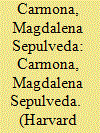

|
|
|
|
|
| Publication |
2014.
|
| Summary/Abstract |
The rapid manner in which social protection systems have gained prominence and political support in development and poverty reduction discourse over the past few years is practically without precedent, leading some to consider it "a quiet revolution." Latin American countries have been at the forefront of this "revolution," with political support for government-funded social protection mechanisms going hand in hand with a growing discourse in favor of a human rights approach in development agendas. This approach is in line with the constitutions of most Latin American countries (including Argentina, Bolivia, Ecuador, Colombia, Guatemala, and Brazil), which enshrine a long list of human rights and explicitly recognize that these norms impose limits on state power. This constitutional protection of rights includes not only civil and political rights, but a wide range of economic, social, and cultural rights (see e.g. the constitutions of Colombia, Brazil, and Costa Rica), the prohibition of discrimination (on the grounds of gender, age, ethnicity, disability, sexual orientation, health status, and others), and the obligation to take affirmative action to protect groups that have suffered from structural discrimination (see e.g. constitution of Ecuador).
|
|
|
|
|
|
|
|
|
|
|
|
|
|
|
|
| 17 |
ID:
053411
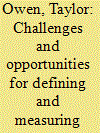

|
|
|
| 18 |
ID:
100374
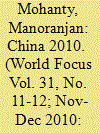

|
|
|
| 19 |
ID:
110971
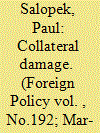

|
|
|
|
|
| Publication |
2012.
|
| Summary/Abstract |
I had been away from Kenya for too long. So when I returned last August, I sought out two long-lost friends.The first was Abdirizak Noor Iftin, an energetic and friendly teacher. He is 26, and he does not belong in Kenya. Iftin is Somali; we had met three years before in his ruined hometown of Mogadishu, where Iftin tutored his young students in English. The job sometimes required darting from house to house under mortar fire. In Somalia one is always in the middle of a war.
|
|
|
|
|
|
|
|
|
|
|
|
|
|
|
|
| 20 |
ID:
098257
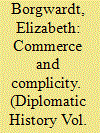

|
|
|
|
|
|
|
|